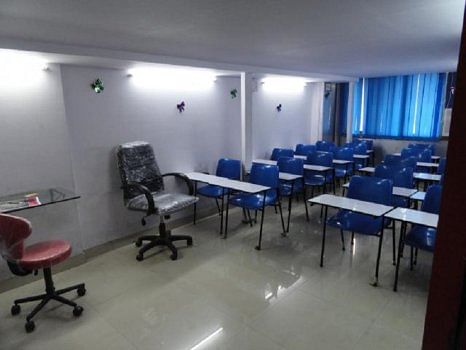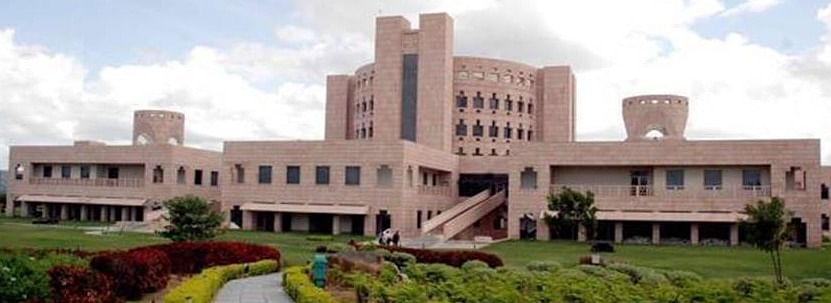CFA: Course Details, Eligibility, Admission, Fees

CFA or Chartered Financial Analyst is a 1.5 year certification course that deals with the knowledge and skills of financial portfolio management, financial analysis, and investment management. There are many job roles that graduates of this course can undertake. Some of them include Auditors, Corporate Financial Analysts, Financial Advisors, Risk Managers, Consultants, Financial Managers, Supply Chain Analysts, and more.
Table of Contents
- About CFA Course
- Eligibility Criteria for CFA
- How To Get Admission for CFA?
- Entrance Exams for CFA
- CFA Subject Weightage
- Study CFA in India
- Top CFA Institutes in India
- University Affiliate Program
- Fee Structure for CFA Course
- Syllabus and Subjects for CFA Course
- CFA Quick Facts
- Why Choose CFA?
- CFA after MBA in Finance
- CFA Course Comparisons
- Preparation Tips for CFA Course
- Salary of a CFA Graduate
- Career Options After CFA Graduation
- Relevance of CFA in India
- Skills That Make You The CFA Graduate
CFA Course Details
| Degree | Certificate |
| Full Form | Chartered Financial Analyst |
| Duration | 1 Year6 Months |
| Age | No age limit |
| Minimum Percentage | 50% in 10+2 from the recognized Board |
| Average Fees | ₹1 - 3 LPA |
| Average Salary | INR 3.5 - 8 LPA [Source: PayScale] |
| Employment Roles | Auditor, Corporate Financial Analyst, Financial Advisor, Risk Manager, Consultant, Financial Manager, Supply Chain Analyst |
| Top Recruiters | Banking Sectors, Auditing Department, Auditing Companies, Auditing Firms |
About CFA Course
CFA full form is Chartered Financial Analyst, and it is one of the most essential courses in portfolio financial analysis. CFA Course's goal is to give students standardised instruction and training in the subject of financial and investment analysis. Chartered Financial Analyst syllabus covers conceptual knowledge of economics, portfolio management, corporate finance, etc.
Chartered Financial Analyst job scope is vast providing employment opportunities with roles such as finance analyst, supply chain analyst, portfolio manager, risk analyst, etc. The training has three CFA levels:
- CFA Level 1
- CFA Level 2
- CFA Level 3
Eligibility Criteria for CFA
Candidates willing to persue CFA must have finished their Bachelor's degree or be in their final year of study at the time of application. In addition, the CFA course requires a candidate to have 4 years of relevant work experience and a solid understanding of the contemporary investment business. Students must take the course's requisite entry tests. There is no upper age limit for enrolling in the course.
How To Get Admission for CFA?
In order to be admitted to the course, aspirants must meet the CFA qualifying criteria in India. Applicants must have completed their bachelor's in any relevant field of study or be in their final year of bachelor's degree to be eligible for admission to the CFA course. A minimum of four years of relevant work experience is also required for entrance to the programme.
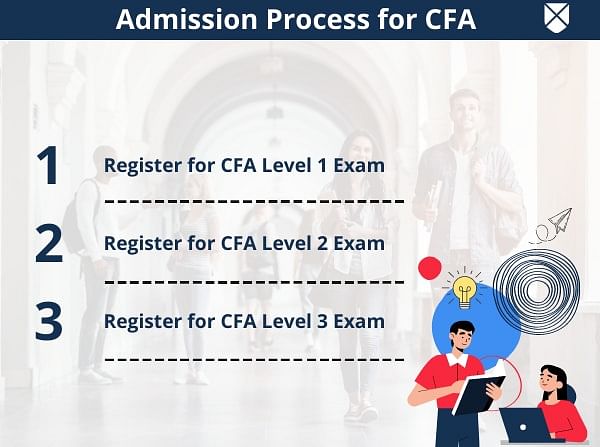
This course is highly challenging as the applicants are supposed to clear the Level I, Level II, and Level III examinations to earn the certificate of CFA.
How to Apply?
The CFA India application process is possible for the students through both online and offline means. Students should fulfil the CFA exam eligibility and then register themselves for the CFA exams. They must fill out the application form and give the examination. For Offline registration, students must go to an official institute, submit all the required paperwork and documents and fill out the form.
CFA Level 1: Registration Process
Below is mentioned the registration process for CFA Level 1:
- Candidates must first create an account on the CFA Institute website, fill out the required information, and choose a testing centre.
- If the candidate intends to train and apply for a scholarship, you must log in as soon as possible and complete the scholarship holding section.
- If the candidate does not receive a scholarship, the next step is to pay an application fee as well as a test fee, which can be paid by credit card, transmission, or other methods and varies depending on the amount when the candidate logs in.
- There are three deadlines for registering for CFA: the first is the cheapest, the second is more expensive, and the third is the most expensive.
- Candidates must pay an additional one-time registration fee of Rs. 34,181 when registering for CFA Level 1 for the first time.
- At the time of registration, candidates must read and agree to the Candidate Agreement.
- Candidates must also submit a statement of professional conduct upon enrollment in the first CFA exam and each year and subsequent exam, which includes but is not limited to relevant citations, proceedings, and investigations. It's something that must be done.
- The results will be available 60 days after the test.
CFA Level 2: Registration Process
Below is mentioned the registration process for CFA Level 2:
- The CFA Level 2 method is similar to the CFA Level 1 method.
- All eligible applicants are welcome to apply for the scholarship programmes.
- If this is not the case, applicants should pay the examination fee after selecting an examination centre before the deadline.
- There may be no enrollment fee this time.
- Applicants should review and accept the Candidate Agreement, as well as post a Professional Conduct Statement, just as they did at Level 1.
- The results are announced 60 days after the examination date.
CFA Level 3: Registration Process
Below is mentioned the registration process for CFA Level 3:
- To register for the CFA Level 3 exam, candidates must fill out the registration form on the CFA Institute's website and choose an exam centre.
- The following step is to choose the most appropriate eligibility criteria from the list of possibilities.
- Applicants must provide information on their profession, employer, location of employer, and level of education.
- Before accepting the candidate agreement, please read it carefully.
- Candidates must choose the format in which they want their CFA study materials to be delivered.
- Candidates must pay with a credit card, a bank transfer, or another method of payment.
Selection Process
Students must ensure that they fulfil all the CFA eligibility requirements and pass the exams for selection in the course. On passing the exams, they become eligible for the CFA certificate. The CFA course duration is a minimum of 1.5 years.
Entrance Exams for CFA
For obtaining the CFA certificate, aspirants must pass the CFA exams. The primary aim of this entrance exam is to have a screening process for the CFA course certification.
The entrance exams' eligibility and criteria change according to the level of CFA course students are applying for. The exact details about the exam depend on the level students are applying for. The CFA course's full details are available online on the official website of the institutes and the exam body.
- CFA Level 1
- CFA Level 2
- CFA Level 3
A Quick Glance at the CFA Exams
To get admission in the Chartered Financial Analyst course, the aspirants need to research and know about the entrance exams. The students can find the CFA course details by going to the official website for the exams. Knowing the Chartered Financial Analyst course details can help the students ensure that they pass the exams and ace the certification. Below is the general pattern for the different levels.
CFA Level 1: Exam Pattern
The CFA Level 1 Exam pattern and guidelines are listed below:
- There will be two portions to the exam, each lasting two hours and fifteen minutes.
- Each half would have 90 multiple-choice questions.
- Topics like ethics and professional standards, quantitative methodologies, economics, and financial reporting and analysis will be covered in the first session.
- Corporate finance, equity, fixed income, derivatives, alternative investments, and portfolio management will be covered in the second session.
- On the level 1 exam, candidates get an average of 90 seconds to answer each question.
- According to studies, passing the CFA level 1 exam requires 303 hours a year.
CFA Level 2: Exam Pattern
The exam patterns and guidelines that candidates must follow for Level 2 exams are listed below:
- It takes 4.5 hours to complete the CFA Level 2 exam.
- The exam is divided into two parts, each lasting 135 minutes with a 15-minute break in between.
- A total of 88 multiple-choice questions are supported with vignettes. As a result, each session contains 44 questions.
- There are 46 multiple-choice questions following each vignette.
- For each correct answer and each MC question, you will receive 3 points.
- It focuses on the valuation of various assets and emphasizes the use of contextual investment tools and concepts.
- The pass rate is 45 % on average.
- To pass the Level 2 exam, candidates must invest 27 hours per month and 328 hours per year.
CFA Level 3: Exam Pattern
The following are the details and guidelines for the CFA Level 3 exam:
- The CFA Level 3 exam takes 4.5 hours to complete, with each session lasting 2 hours and 15 minutes.
- There are a total of 8-11 vignettes in the first session, followed by MC questions in the second.
- The Level 3 exam has a total of 44 multiple-choice questions.
- There are also essay-style questions that are worth varying amounts of points. Candidates must type their responses in the text box provided.
- For MC questions, there are three or more options.
- By requiring candidates to integrate all concepts and analytical methods throughout the syllabus, this course focuses on effective asset planning and portfolio management.
- To pass the Level 3 exam, candidates must devote approximately 344 hours per year. The success rate was 54 % on average.
Read More: CFA Exam
CFA Subject Weightage
To clear the CFA and practice it professionally, the candidate must complete and pass all three levels of exams. Each CFA exam level is for 6 hours, and each level’s subject carries a specific weightage. Below is a tabulated detail of each subject and level’s weightage.
| Topics | CFA Level 1 | CFA Level 2 | CFA Level 3 |
| Ethical and Professional Standards | 15 | 10 - 15 | 10 - 15 |
| Equity Investment | 10 | 15 - 25 | 5 - 15 |
| Quantitative Methods | 12 | 5 - 10 | 0 |
| Fixed Income | 10 | 10 - 20 | 10 - 20 |
| Economics | 10 | 5 - 10 | 5- 15 |
| Derivatives | 5 | 5 - 15 | 5 - 15 |
| Financial Reporting and Analysis | 20 | 15 - 20 | 0 |
| Alternative Investments | 4 | 5 - 10 | 5 - 15 |
| Corporate Finance | 7 | 5 - 15 | 0 |
| Portfolio Management and Wealth Building | 7 | 5 - 10 | 40 - 55 |
| Total | 100 | 100 | 100 |
Study CFA in India
India is home to some of the premier institutions and universities offering CFA courses. Here is a list of some of the colleges that offer CFA:
| College Name | Average Fees |
| Narayana Business School, Ahmedabad | INR 1.25 LPA |
| International College of Financial Planning, New Delhi | INR 45,000 P.A |
| CIIMS, Jabalpur | INR 32,500 P.A. |
| International College of Financial Planning, Mumbai | INR 40,000 P.A |
| Global Center for Entrepreneurship and Commerce (GCEC), Jaipur | INR 1.9 LPA |
| Shri Chimanbhai Patel Institute of Professional Training, Ahmedabad | INR 65,000 P.A. |
Top CFA Institutes in India
Many prominent colleges around the country provide CFA degrees and education. Below is the list of the ten best CFA colleges in India:
| SI.No. | Name of the College |
| 1 | Amity University, Noida |
| 2 | CIIMS, Jabalpur |
| 3 | G.D. Goenka, Gurugram |
| 4 | Bennett University, NOIDA |
| 5 | Lovely Professional University |
| 6 | ICOFP, New Delhi |
| 7 | Narayana Business School, Jaipur |
| 8 | ICOFP, Kolkata |
| 9 | ICOFP, Chennai |
| 10 | ICOFP, Lucknow |
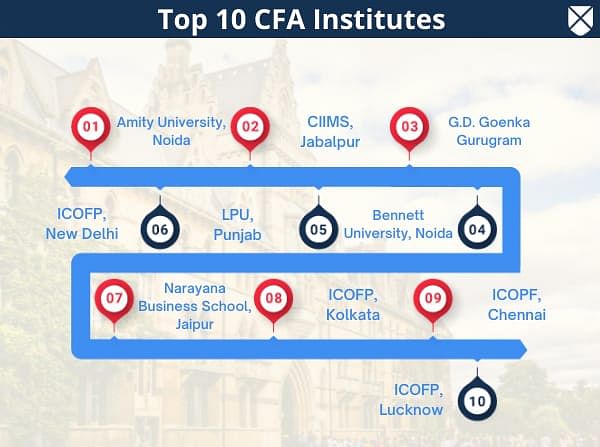
University Affiliate Program
The CFA Institute also has a University Affiliate Program. Universities adopt a portion of the CFA Program Candidate Body of Knowledge (CBOK), including ethics and codes of conduct.
The programme is intertwined with the investment management programme and will assist students in passing the CFA exam.
Fee Structure for CFA Course
The CFA course fees in India are not a fixed fee and can vary according to the level students are opting for and many other factors. The general range of the CFA fees in India is INR 1 - 3 LPA. Some of the factors that affect the CFA fees are reputation, location, competitiveness, and institute faculty.
Syllabus and Subjects for CFA Course
The students can access the CFA details by going to the official college or institute website. The CFA course syllabus is oriented toward helping students ace the exams and gain certification without hurdles. The CFA subjects depend on the level at which students are studying. Listed below are CFA course details in India and some of the core subjects taught to the aspirants during their certification. Some of the subjects from all 3 CFA levels are given below:
- Ethical and Professional Standards
- Corporate Finance
- Economics
- Corporate Finance
- Alternative Investments
- Fixed Income
- Quantitative Methods
- Corporate Finance
- Portfolio Management & Wealth Planning
Read More: CFA Syllabus and Subjects
CFA Quick Facts
Here are some interesting facts to remember about the CFA exam:
- One out of every twenty candidates misses the start of the CFA exam even when they arrive at the testing centre.
- Calculators were not allowed in the CFA exam hall until 1975. On the other hand, they are presently restricted to only two types of calculators.
- Initially, candidates were not permitted to use the restroom during the CFA exam. The rules have changed for a pregnant lady who has to use the restroom urgently.
- The results of the CFA exam are always revealed on Tuesday.
- The CFA test attracts about 1.6 lakh students from all around the world. The Asia Pacific area has the most candidates for the CFA test.
Why Choose CFA?
When deciding to pursue CFA as a career path, students must ensure that they research and understand CFA. The course prepares students with business, taxation, and accounting information. To understand the answer to the question, "Why choose CFA?", "What is CFA?" we should make it simpler by breaking it down into the following three short questions:
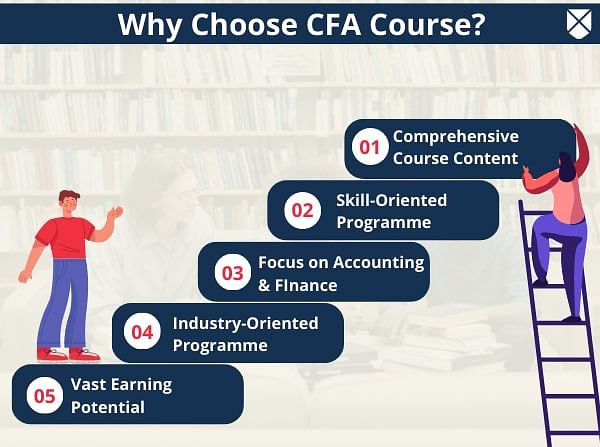
What is CFA All About?
"What is the CFA course all about?" students frequently inquire. In India, the minimum CFA course duration is 18 months or 1.5 years. When selecting to pursue this course, it is critical for applicants to gain as much knowledge as possible about the course. Chartered Financial Analyst (CFA) is a broad branch of study that focuses on developing investment and financial management skills and knowledge.
CFA is a programme that teaches candidates about the financial components of the industry and how to run financial operations. Quantitative Methods, Security Analysis, Portfolio Management, Alternative Investments, Derivatives, Financial Reporting and Analysis are among the tools and inputs covered in this course.
What Does a CFA Graduate Do?
The CFA curriculum covers abilities needed at all phases of the career, including academic theory taught in three levels, field practise gained through job experience, and providing candidates with a professional and ethical foundation. Candidates learn sophisticated investment characteristics as well as portfolio management ethics.
The CFA programme attempts to teach finalists how to make financial judgments in stocks, industries, corporations, and on an individual basis. In their work as a Financial Analyst, they perform a variety of shared functions, some of which are given below:
Financial Consulting: One of the popular roles undertaken by the graduates of this role is consulting organizations in their financial services. During the certification, students gain a lot of exposure and knowledge about doing so, and therefore, they popularly choose this role.
Reasons Why CFA Course Can Fetch You a Rewarding Career?
CFA stands for Chartered Financial Analyst and is one of India's most well-known and well-recognized financial accreditation courses. The first step toward earning a CFA certificate is to take the CFA Level I course. This course has a wide range of applications and is in high demand for the reasons or benefits listed below:
- Accreditation at the international level: The CFA Institute's CFA accreditation is recognised and accepted in over 165 countries around the world. CFA Level I is the first step toward becoming a Chartered Financial Analyst and earning a CFA certification.
- Huge Employment Opportunities: Candidates who pass CFA Level I will be able to find lucrative and high-quality jobs in both the private and public sectors. CFA jobs include investment managers, portfolio managers, risk managers, and even chief financial officers.
- High Salary: Candidates with a CFA Level I can apply for a variety of prestigious, high-quality positions in the financial sector. Salary ranges from INR 4 LPA to INR 40LPA for CFA Level I, which is significantly higher than other well-known jobs.
- Career Opportunities: India is known as the accounting capital of the world, with a plethora of career opportunities. After completing CFA Level I, you can move on to CFA Level II. India is home to the majority of multinational financial firms, providing CFA professionals with plenty of opportunities.
Read More: CFA Jobs and Scope
CFA after MBA in Finance
The CFA curriculum for Level 1 overlaps significantly with the MBA Finance curriculum. Although most MBA graduates are hesitant to take additional financial courses, this is not accurate. A person with an MBA in finance should have a CFA for several reasons. Some of them are described in the following paragraphs:
- Finance-focused: The CFA Level 1 Foundation Course follows a curriculum similar to that of the MBA in Finance. The CFA Levels 2 and 3 focus on hardcore finance, which is beneficial in the investment industry.
- Various Opportunities: Chartered financial analysts open up many job opportunities in investment banks, equity research, hedge funds, and other fields, and their resumes carry unrivalled weight.
- Adaptability in a Changing Financial Environment: The financial markets are a dynamic industry that is always changing and evolving. The demanding CFA curriculum prepares students for the complexities of investment and major financial markets.
CFA Course Comparisons
After graduation, candidates who want to work as chartered financial analysts should take the CFA course. Candidates frequently misunderstand the terms CFA, CA, and MBA. We'll compare the CFA course to the CA and MBA courses in the next section based on similar criteria to see which offers better career prospects and outcomes.
CFA vs CA
The following are some key distinctions between CFA and CA:
| Full-Form | Chartered Financial Analyst | Chartered Accountancy |
| Course Duration | 1.5 - 4 years | 4-5 years |
| Eligibility | Have a bachelor's (or equivalent) degree, or be in the final year of a bachelor's degree at the time of registration, or have 4 years of qualified, professional work experience or a combination of work/college experience that totals four years. | Students can apply for CA Foundation exams after clearing their 12th with minimum threshold marks (guided by ICAI) |
| Average Fees | INR 1.9 - 5.86 LPA | INR 50,000-INR 3 LPA |
| Entrance Exam | No entrance exam | CAT |
| Top Colleges | Narayana School of Business, GCEC, International College of Finance Planning | Pear CA College, Symbiosis International, Academy of Commerce |
Read More: CFA Vs CA
CFA vs CMA
The following are some key distinctions between CFA and CMA:
| Full-Form | Chartered Financial Analyst | Certified Management Accountants |
| Course Duration | 1.5 - 4 years | Around 3 years |
| Eligibility | Have a bachelor's (or equivalent) degree, or be in the final year of a bachelor's degree at the time of registration, or have 4 years of qualified, professional work experience or a combination of work/college experience that totals four years. | Candidates must have passed the CMA Foundation exam and received their 10+2 diploma from a recognised board in any subject. Work experience in a related field may be requested as well. |
| Average Fees | INR 1.9 - 5.86 LPA | INR 4,000 P.A - INR 41,000 P.A |
| Entrance Exam | No entrance exam | The CMA examination is administered by the Institute of Chartered Accountants of India (ICAI), formerly known as the Institute of Cost and Work Accountants (CMA). The Institute of Cost Accountants, also known as ICMAI, administers the exam twice a year in June and December. |
| Top Colleges | Narayana School of Business, GCEC, International College of Finance Planning | St.Joseph’s College of Commerce, Garden City University |
Read More: CFA vs CMA
CFA vs MBA
The following are some key distinctions between CFA and MBA:
| Full-Form | Chartered Financial Analyst | Master of Business Administration |
| Course Duration | 1.5 - 4 years | 2 Years |
| Eligibility | Have a bachelor's (or equivalent) degree, or be in the final year of a bachelor's degree at the time of registration, or have 4 years of qualified, professional work experience or a combination of work/college experience that totals four years. | Students need 50% in graduation from any stream and pass the entrance exam such as CAT, MAT, XAT, GMAT, etc. |
| Average Fees | INR 1.9 - 5.86 LPA | INR 2 -INR 3 LPA |
| Entrance Exam | No entrance exam | CAT, XAT, MAT, GMAT |
| Top Colleges | Narayana School of Business, GCEC, International College of Finance Planning | IIM, S.P. Jain Institute of Management and Research, Indian Business School |
Read More: CFA vs MBA
Preparation Tips for CFA Course
Students should always have a plan when pursuing a competitive course such as CFA.
Invest in CFA Books: When pursuing a difficult and competitive course such as CFA, it is an essential step for the student to go through the CFA level 1 books, CFA level 2 books, and CFA level 3 books depending on their level. Investing in books can help them prepare for the exams better and increase their chances of obtaining the certification without any hurdles.
Salary of a CFA Graduate
According to Payscale, the average salary is INR 3.5 - 8 LPA for a CFA in India. The salary varies according to different factors such as the experience that students gain, the job designation, the city, and more.
Read More: CFA Salary
Career Options After CFA Graduation
The CFA course has a very rewarding and promising career path for graduates. The CFA course will increase the professional value of the candidates and guide them to a high-paying job or possibly a promotion in the company they are already working in, as the CFA syllabus is programmed to reach the advanced level in the area of finance.
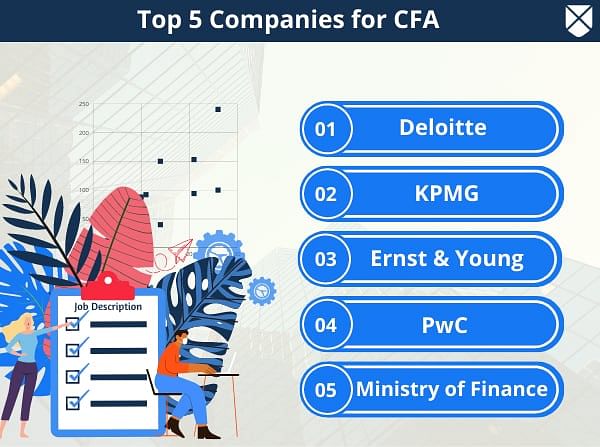
Some of the industries students can work in are mentioned below:
- Banks
- Financial Management Firms
- Public Limited Companies (Pvt Ltd).
- Auditing Firms (such as KPMG, Price Waterhouse, etc.)
Relevance of CFA in India
India is a major accounting powerhouse. The majority of multinational corporations begin operations in India. If the IMF benefits from a 10% growth rate, the value of domestic financial statements in India will be enormous. There are many different types of CFAs, and some of them are listed below:
Indian KPO’s Research
International companies are focusing on lowering labour costs due to the COVID-19 pandemic. Because of low labour costs, most KPOs, investment banks, and financial services firms have relocated to India. A CFA degree is extremely valuable because it is the highest qualification in the investment finance industry.
Indian Broker’s
Indian stockbrokers are expanding their reach and scope beyond their home country. For such operations, a CFA degree is recommended. Candidates are introduced to various aspects of the primary and secondary markets and their functions in the CFA course curriculum.
Wealth Management Firms
Indian stockbrokers are expanding their reach and scope beyond their home country. For such operations, a CFA degree is recommended. Candidates are introduced to various aspects of the primary and secondary markets and their functions in the CFA course curriculum.
Skills That Make You The CFA Graduate
CFA graduates need soft and hard skills that help them build a successful career. These skills are necessary for students to pass the CFA exams easily and help them in their career paths. These skills are essential for working professionals as they can help them get a sharper edge compared to their co-workers. Some of these skills include:
- Quantitative skills
- Communication skills
- The Ability to Work Under Pressure


